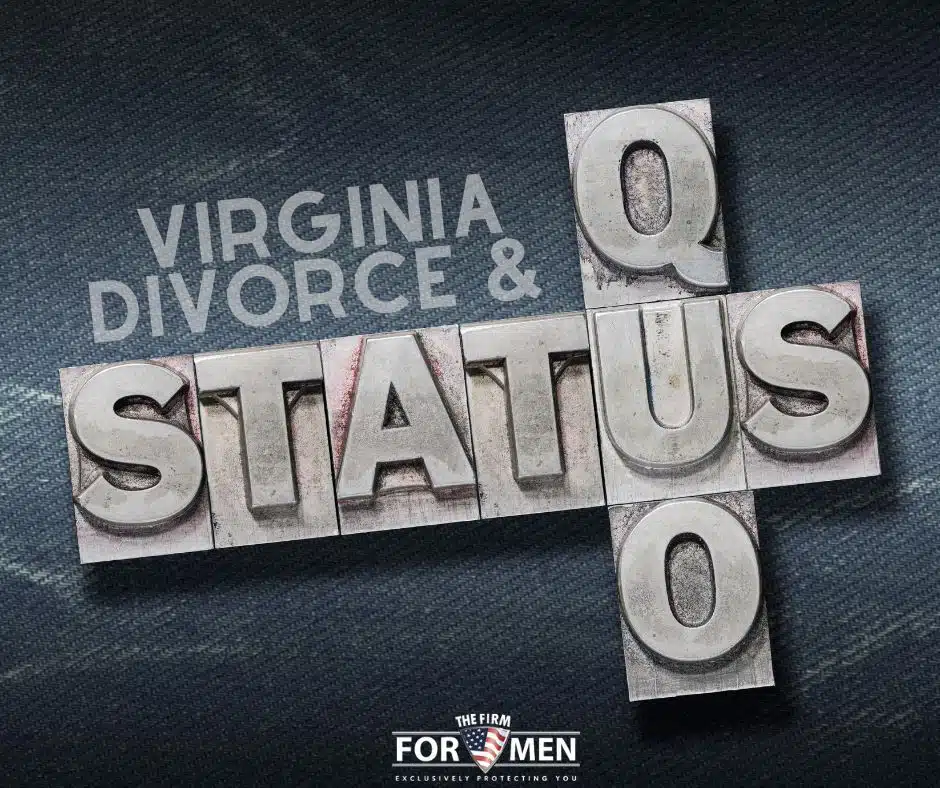Three public institutions of higher learning offer degrees in Latin. Understanding Latin could come in handy if you want to be an attorney, since words like status quo are everywhere in legal texts. The status quo in Virginia law means “the existing state of affairs.” What could that have to do with Virginia divorce? The answer is another Latin term: pendente lite.
Jump to a Section
- What Does Status Quo Mean in Divorce?
- What is a Pendente Lite Order?
- Pendente Lite Orders are a Layer of Protection
- How Important is the Status Quo in Divorce?
- The Pendente Lite Hearing
What Does Status Quo Mean in Divorce?
To maintain the status quo in a separation and divorce means to keep things bob-bob-bobbin’ along much as they were before the proceedings.
If you were both paying into an account to pay the mortgage, maintaining the status quo means you both keep paying. If you both picked up Little Lulu and Big Brother Bubba from school, you both still spend time with your kids.
A Virginia judge can acknowledge that the marriage between two adults is no longer thriving. Yet the same judge can also recognize all the other prosaic bits and pieces of a marriage that must continue to function, especially if children are involved:
- Child custody
- Paying child support
- Home maintenance and repair
- Paying the mortgage and homeowner insurance
- Saving for and paying real estate, federal, state, and local taxes
- Attending family gatherings, holidays, and social events
- Ongoing medical, religious, and educational decisions about the children
You and your spouse maintain the status quo through a court-issued pendente lite order. Following the court order helps you both avoid rash decisions, sudden changes to income or outgo, or alarming your children.
What is a Pendente Lite Order?
The Latin term pendente lite means “pending the ongoing litigation.” Your separation and eventual divorce is the litigation because one of your attorneys — either your attorney or your spouse’s — files a lawsuit for divorce.
A pendente lite order is filed to hold some things status quo while asking for some changes to that status quo in other areas.
Child custody is often awarded, temporarily, through a pendente lite order. One party to the suit files the pendente lite motion and the Virginia judge holds a very brief (half hour to an hour) hearing to address immediate concerns, not unwind the entire marriage. The order is temporary, no matter what areas it touches upon:
- Spousal support
- Child custody
- Child support
The pendente lite order is a court order, so both spouses must comply. If the judge temporarily awards your kids to your spouse, you have no legal right to ignore the order. Doing so holds you in contempt of court.
Pendente Lite Orders are a Layer of Protection
Both spouses receive protection from a pendente lite order to maintain the status quo. The pendente lite order can help prevent one spouse from taking the children, for example. That’s a crime called abduction and kidnapping, under Virginia Code § 18.2-47. It is a Class 6 Felony.
(Just as an aside, and we know you’re asking for a friend: a Class 6 Felony conviction can land you your friend in prison for one to five years and cost you up to $2,500, under § 18.2-10.)
If, thanks to the pendente lite order, you and your spouse are unable to make drastic changes to the financial, social, and familial aspects of your married lives, you are protected from each other and from your own worst instincts.
How Important is the Status Quo in Divorce?
Why should either party to a separation and divorce want to freeze the current, potentially miserable situation in place? You have either six months (without children from the marriage) or a year (with children) to stay separated before you can divorce, in most cases. Does the Commonwealth really expect you to twiddle your unhappy thumbs for that long?
Yes.
A well-constructed pendente lite order maintains the status quo for everyone’s benefit. Pendente lite orders help prevent marital waste, irrational decisions, and domestic violence. The court’s order can stop strong emotions from destroying the lives of your spouse, your kids, and yourself.
Some spouses seek revenge on their spouses by wrecking the marital home. Some spouses deliberately spend down savings accounts or tap retirement funds, all to punish each other. Some spouses key the beautiful paint job on the family minivan. What does all of that get you? Nothing.
You’ve vented your spleen and have expensive repairs ahead. You have lost your financially secure future.
If you and your spouse have kids, your kids’ lives are already upended by the turmoil of separation and divorce. They will face trauma, whether the two parents want to acknowledge it or not.
Why make things worse by making sweeping changes to their lives during the separation or before the final divorce decree? Let them spend their school year in the same family home. Let them keep their friends. Leave them some stability as their lives are altered forever. Maintain the status quo.
The Pendente Lite Hearing
Either party can request a pendente lite hearing, but would be wise to speak with a divorce attorney before doing so. The more organized you and your experienced family law attorney are, the earlier you will have everything together to ask for the hearing. Even if you do not have all your final decisions in place, you can at least preserve the relative peace and sanctity of your family home while the litigation is pending.
The Firm For Men can answer your questions about divorce, separation, Latin legal terms, and much more. Contact our Virginia Beach office today, or give us a call at (757) 383-9184.

